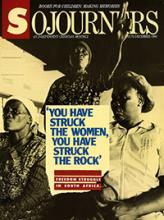In September, less than a week after the Episcopal Church elected Rev. Barbara C. Harris as its first woman bishop, Pope John Paul II issued yet another statement expressing his unequivocal opposition to the ordination of women as priests. While the ironic timing of the two events was completely coincidental, it highlights the intensity of opinion and the depth of division over the issue.
It would appear that nothing can rouse the ire of traditional church fathers like the acknowledgment and promotion of a church mother whose name is not Mary. The long-expected and, in many circles, dreaded, election of a woman bishop in the Episcopal Church has further entrenched many leaders in the Episcopal Church, the worldwide Anglican Communion, the Roman Catholic Church, and other denominations in their opposition to women's ordination.
Harris' election represents the opening of an important door for women in the church, but it remains to be seen whether she and others will be allowed to walk through it. Before she can be consecrated as bishop, a majority of the church's bishops and a majority of diocesan committees must approve Harris' election.
In light of the significant victory that Harris' election represents, the pope's latest apostolic letter is both tragic and revealing. The letter, ironically titled "The Dignity of Women," is notable not for the pope's repetition of a common theological argument against the ordination of women, but for his less widely reported statements about the very nature of women.
Read the Full Article

